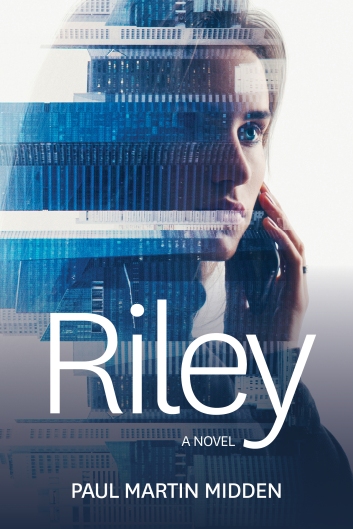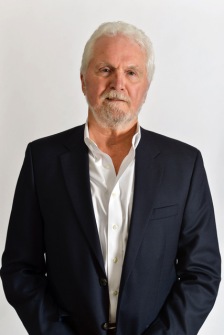 Genre: Contemporary adult fiction
Genre: Contemporary adult fiction
Author: Paul Martin Midden
Website: http://www.paulmidden.com
Publisher: Wittmann Blair Publishing
Find out more: http://www.paulmidden.com/riley.html
About the Book:
Riley, a young writer, finally divorces her husband and begins a novel about a fictional couple in conflict. Supported by her best friend, Jennifer, she begins her life of freedom. In a complicated turn of events, she meets and beds Edward, a shy young man who falls for her instantly. She does not want to continue the relationship, however, and her refusal lays the groundwork for a series of dangerous events. Her conflicts and those of her characters play out in this psychologically intriguing story.

About the Author:
Paul Martin Midden is the author of five previous novels, each of which explores different writing styles. He practiced clinical psychology for over thirty years. Paul’s interests include historic restoration, travel, fitness, and wine tasting. He and his wife Patricia renovated an 1895 Romanesque home in 1995 and continue to enjoy urban living.
Excerpt:
Riley Cotswald sat at her desk staring at the blank screen in front of her. What do I write? she wondered. That’s a stupid question, came an immediate reply from somewhere in her head. Questioning myself about writing never helped anything. The only thing that matters is putting words on paper. I learned this with my first book.
She turned her head away from the screen and peered through the window of her small DC apartment. The sky was a Washingtonian blue, she observed, and if she looked down just a bit she could see the cherry blossoms beginning to burst. Just like me, she hoped.
But she did not feel herself bursting; all she felt was stuck at her desk, like a child in detention.
Knowing that distraction and procrastination were the two big things that worked against her getting anywhere with her writing, she forced herself to turn back to her computer screen. She had been able to do this earlier in her life, and she always associated writing with a special kind of experience, a mystical or even a spiritual one, whatever that meant. It was something she couldn’t put into words; the irony of that was not lost on her nonreligious self.
I can do this, she told herself; and she forced herself to place her hands over the keys. The only way to start is to start, she thought. And so she believed.
She took a deep breath, closed her eyes, and commanded her fingers to move.
They weren’t listening.
Riley leaned back in her chair. This is harder than I remembered.
She lectured herself: It doesn’t matter that you have no idea what to write about. Remember when you started? When you wrote that first book? The one that sold? The one that allowed you to write full time? It wasn’t that long ago; just a year ago you were on a book tour, touting you image as an up-and-coming young author. And you promised yourself and your publisher that you would produce another. That is why you are here. To produce another saleable book.
She sighed. Back the, ages ago, writing just seemed to flow and took on a life of its own. All Riley had to do was channel it and type. This was, of course, the narrative she told herself. The fact is she cannot really remember how she did it. Not exactly.
But this mystical narrative seemed to her to be largely true, although in a corner of her mind she thought perhaps the whole experience was romanticized a bit by time. She believed that’s how it should happen. Magically. The stories are inside me and all I need to do is make my fingers move across the keyboard. The narrative will take care of itself.
But maybe not. Maybe there is some other way. An outline? A summary? No. Writing is an art. Being creative is just that: an act of creation, one that required, even demanded, discipline, but one which at base was artistic, creative. So create! Write!
She tried to stop thinking and closed her eyes once more. She knew what she was doing. All these thoughts were just distractions. And the more self-critical the thoughts, the more distracted she became and the further away she came from the act of creation.
Riley sprang out of her chair to move, to breathe, to stop the pattern of useless thinking that was preventing her from doing the writing she most wanted to do. She walked around her small apartment. If Cameron were there she would engage him somehow; she would whine to him. She wouldn’t call it whining, but that’s what it would be. It was always whining. It was saying out loud what went through her head, albeit in a more articulate voice. She would berate herself, and he would reassure her, no matter how dismal she judged her life to be at that moment or how crippled she felt putting words to paper. Or how little he actually understood what she was saying.
On reflection, that seemed like one of the best reasons to be with someone: having someone to complain to. And have that person reassure you, even if you knew that the soothing words were insincere, as in Cameron’s case. He tried to be sympathetic, but that trait did not seem to exist on his genome; the fact was dismal on the listening end. . . She shook her head. She didn’t need to go there.
Riley sat back down and repositioned her fingers over the keyboard. She took yet another deep breath. In the back of her mind, she could hear a familiar voice: Scream all you want, young lady. If this is what you want, this is what you must do. It’s as simple as that.
She straightened her shoulders. Okay, this is what I want, so this is what I must do. She replaced her fingers over her keyboard and started typing.
Adam Wilkerson did not want to do what he knew he needed to do.
She sat back and checked in with herself. This is more like it.
He had been thinking about it for weeks, maybe even months. Definitely months. A year? Could be a year. He tried to avoid it; in fact, he tried everything he could think of to shield himself and his wife from what he needed rather than wanted to tell her. He wondered about how she would take it. He didn’t think she would take it well.
Adam was sitting at home, waiting for his wife to return. It was Saturday; she had gone shopping. Where or for what he had no idea. It was hard to imagine that she really needed anything. He thought she was just killing time until . . . until what? Until night fell and she could go to sleep and forget her own unhappiness for a few hours. That is, if she slept. That nocturnal pleasure has been coming hard for Mrs. Wilkerson recently. Adam knew this all too well; his wife wasn’t the only one lying awake in silence at night. What he didn’t know was what to do about it.
Touchy ground, Riley mused. She felt herself pale a bit, and she noticed her hands were sweaty. Anxiety, she knew. And maybe excitement. Perhaps both. She did not take her eyes off the screen.
Adam wondered, even at this late date, if there were some way to avoid this, to somehow give his marriage yet another lease on life. Then he could avoid the discussion he promised himself he would have. But his mind was blank. He had tried everything. He tried being assertive and firm and then warm and kind; he tried to be inviting and disclosing and a little removed and distant. Nothing, absolutely nothing helped impede the belief that had been growing in his mind that he was just out of gas. By which he meant that the marriage was out of gas. No more fuel in the tank. Running on empty. The relationship platitudes were coming fast enough to fill a silly daytime advice show.
Riley leaned back in her chair without taking her eyes off the screen. This was a habit of focus: looking at the screen was still writing, even if her hands were not tapping on the keys. She knew the anxiety was there and she knew why. She didn’t want to give her nervousness any space; nor did she want to draw comparisons to her current life. She was sure that would make it harder for her to write.




